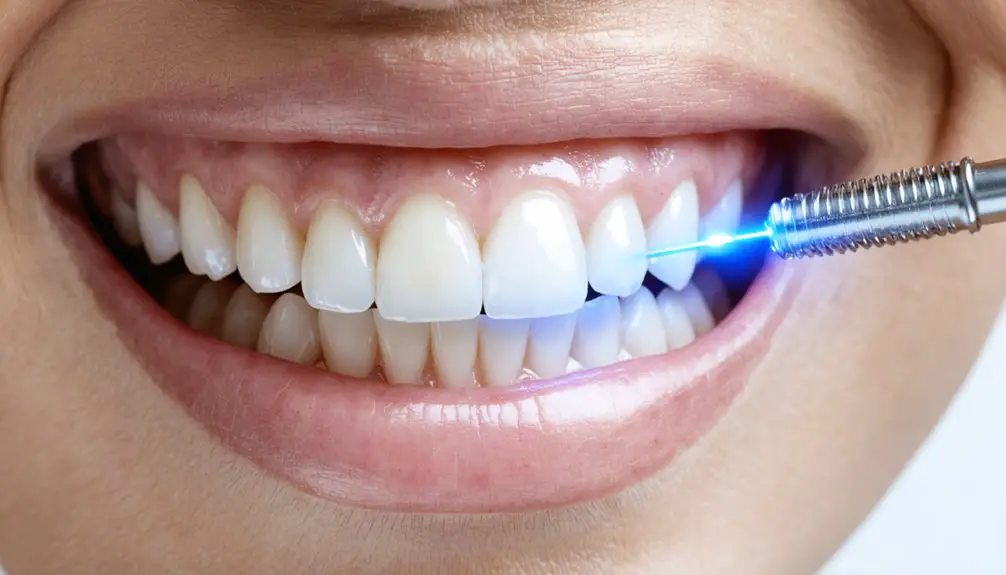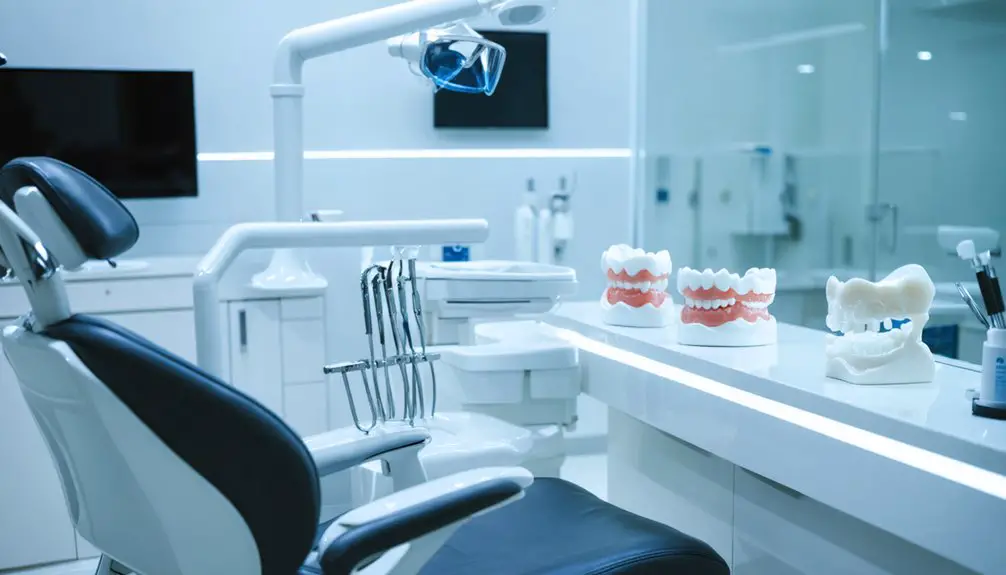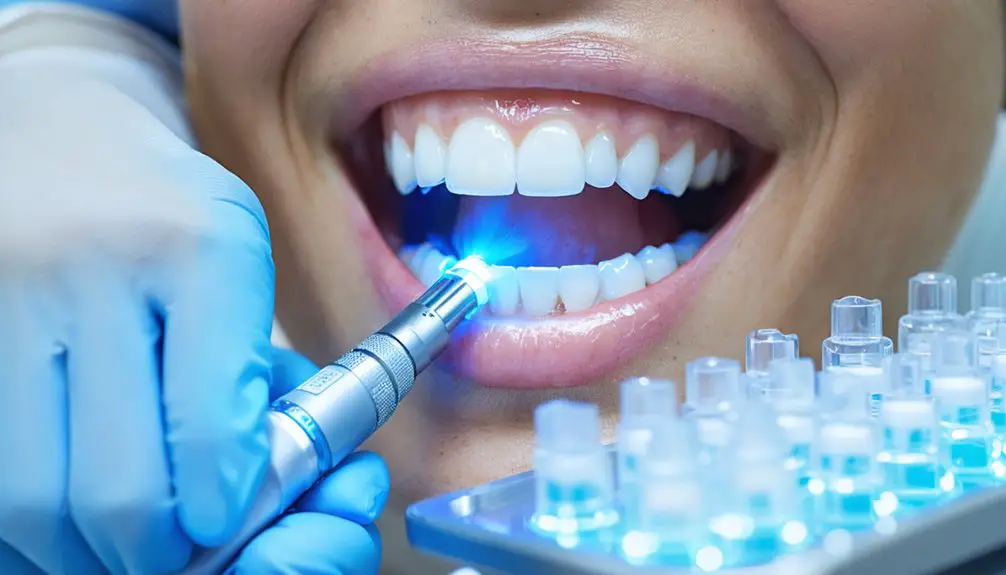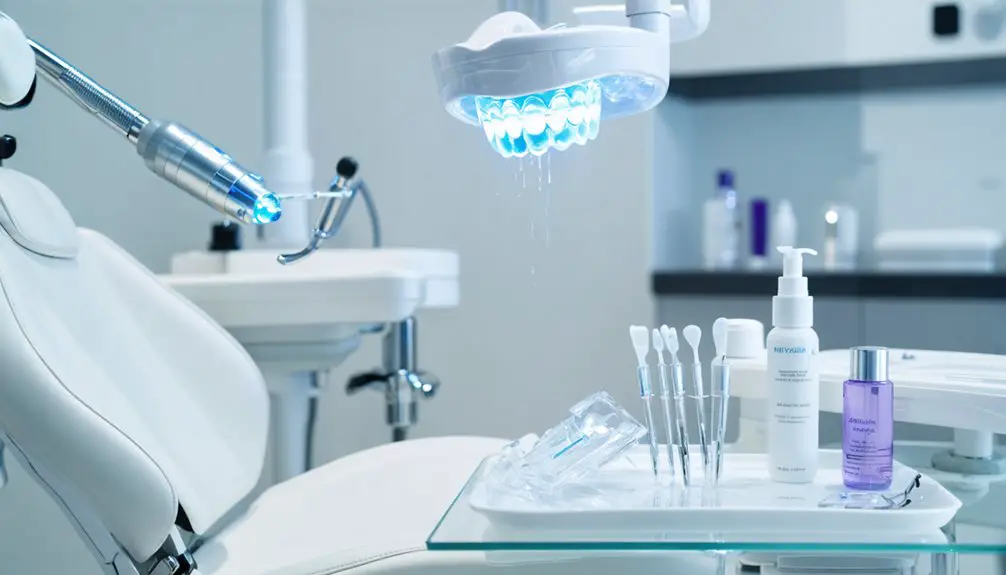You’ll find laser teeth whitening offers similar effectiveness to traditional methods, achieving 5-8 shade improvements in a single hour-long session. While it reduces gel contact time by 50%, studies show it doesn’t consistently outperform non-light activated treatments, with both achieving comparable ΔE values of 3.3. Results typically last 6 months to 3 years with proper maintenance. Multiple factors influence your treatment success, from initial tooth shade to genetic makeup.
Key Takeaways
- Laser teeth whitening produces similar results to traditional methods, achieving color changes (ΔE values) of 3.3 in clinical studies.
- Treatment reduces gel contact time by 50% while maintaining effectiveness comparable to non-light activated whitening methods.
- Single sessions can improve tooth shade by 5-8 levels within one hour of treatment.
- Results typically last between 6 months to 3 years with proper maintenance and oral hygiene.
- Effectiveness varies based on initial tooth shade, type of staining, and individual factors like enamel thickness.
Understanding Laser Whitening Results Vs Traditional Methods
While laser teeth whitening has gained popularity as an advanced treatment option, clinical evidence suggests its effectiveness compared to traditional methods is more nuanced than marketing claims might indicate. Professional supervision ensures optimal safety during the procedure.
Studies show that laser activation doesn’t consistently outperform traditional whitening methods without light activation.
Research indicates laser-activated teeth whitening treatments show no significant advantage over conventional whitening methods that don’t utilize light technology.
When examining laser efficacy, you’ll find that diode laser treatments can reduce gel contact time by half while maintaining results comparable to conventional protocols. Research indicates laser treatments achieve similar ΔE values of 3.3 as other in-office methods.
However, traditional comparisons reveal that combining one in-office laser session with at-home carbamide peroxide treatment doesn’t yield superior outcomes compared to home bleaching alone.
The success of laser whitening often depends on specific factors like tooth shade, patient age, laser wavelength, and power settings.
Younger patients and certain initial tooth hues tend to respond better to laser treatment.
Patient Safety and Potential Side Effects
Although laser teeth whitening has proven generally safe when performed correctly, understanding its potential side effects and safety considerations remains essential for both practitioners and patients.
The most common side effects include temporary tooth sensitivity and gingival irritation, particularly when higher peroxide concentrations are used. The non-invasive procedure ensures minimal discomfort during treatment. While these effects typically resolve within days, proper technique and protective barriers help minimize patient discomfort. A dental health exam must be completed before any whitening treatment can begin.
Several treatment contraindications exist, including pregnancy, breastfeeding, active gum disease, and untreated decay. You’ll need careful evaluation if you have extensive dental work, as results may be uneven.
Children and adolescents should generally avoid laser whitening due to developmental concerns. Though permanent damage is rare when performed correctly, the procedure requires precise laser parameters and gel formulation to protect dental structures from thermal and chemical risks.
Cost-Benefit Analysis of Professional Laser Treatment
Because laser teeth whitening represents a significant investment, understanding its cost-benefit relationship proves essential for informed decision-making.
Making an informed decision about laser teeth whitening requires carefully weighing its substantial costs against potential long-term benefits.
You’ll typically invest between $611 and $1,500 for professional laser treatment, with costs varying by location and provider. While this exceeds at-home alternatives ($375-$600), the value proposition centers on immediate, dramatic results – achieving 5-8 shade improvements in just one hour. Geographic location often plays a major role in determining the final cost, with major metropolitan areas charging premium rates.
When evaluating cost considerations, you’ll find laser treatment’s durability particularly compelling, lasting 6 months to 3 years with proper maintenance. This extended longevity, combined with professional supervision and stronger whitening agents, often justifies the higher initial expense.
Most insurance providers consider laser whitening a cosmetic procedure and do not cover the treatment cost.
In treatment comparison, laser whitening’s rapid results and reduced need for frequent touch-ups can offset the premium pricing versus over-the-counter or at-home options.
Key Success Factors for Optimal Whitening Results
To achieve ideal results from laser teeth whitening, several key factors must work in concert. Your initial tooth shade and type of staining greatly influence treatment success, with extrinsic stains responding better than intrinsic ones.
Professional whitening techniques, particularly laser-activated treatments, deliver top outcomes when combined with proper preparation and protection protocols. Skilled dental professionals can customize treatment plans based on individual patient needs.
Your genetic makeup and age affect results through variations in enamel thickness and natural tooth color. Certain medications like tetracycline antibiotics can significantly impact whitening effectiveness.
You’ll need to maintain consistent oral hygiene and adjust lifestyle habits, especially avoiding staining substances post-treatment.
Patient expectations should align with realistic outcomes based on your specific conditions.
Following your dentist’s instructions precisely and addressing any pre-existing dental issues before treatment will help guarantee the best possible results and long-lasting effects.
Long-Term Effects and Maintenance Requirements
The long-term success of laser teeth whitening depends greatly on your commitment to proper maintenance and lifestyle adjustments.
While whitening longevity typically spans 1-3 years, you’ll need to implement specific maintenance practices to achieve ideal duration. Laser teeth whitening provides a non-invasive treatment requiring minimal recovery time.
You must maintain rigorous oral hygiene habits and minimize exposure to staining agents like coffee, tea, and red wine. Using a straw for beverages can help protect your teeth from direct contact with staining substances. Your genetic predisposition can affect how well your teeth retain their whiteness over time.
Regular professional check-ups and occasional touch-up treatments will help sustain your results.
Be aware that excessive whitening can lead to enamel erosion and increased sensitivity. Since enamel doesn’t regenerate, it’s important to follow professional guidance on treatment frequency.
You’ll achieve the best long-term outcomes by balancing aesthetic goals with proper enamel protection.
Frequently Asked Questions
Can Laser Teeth Whitening Fix Tetracycline Stains or Fluorosis?
Like a shallow stream, laser whitening won’t fully penetrate deep tetracycline stains, though you’ll see moderate improvement. For fluorosis treatment, you’ll achieve better results when combining laser with microabrasion techniques.
Is Laser Whitening Safe for Patients With Dental Crowns or Veneers?
While laser whitening won’t damage your crowns or veneers, you’ll likely experience uneven results and possible crown sensitivity. Veneer compatibility is limited, as restorations don’t whiten like natural teeth do.
How Soon After Laser Whitening Can I Undergo Other Dental Procedures?
Like Sarah’s case, you’ll need to wait 1-2 weeks for proper post-whitening care. This dental timing guarantees your teeth’s color stabilizes and sensitivity subsides before proceeding with other treatments.
Does Smoking Immediately Void the Effects of Laser Teeth Whitening?
While smoking doesn’t instantly void whitening effects, your smoking habits will considerably reduce whitening longevity. You’ll see accelerated staining within 48 hours, so it’s essential to avoid tobacco during this period.
Can Laser Whitening Treat Internal Tooth Discoloration From Root Canal Treatment?
Studies show there’s no significant advantage (*p* > 0.05) using laser whitening over conventional bleaching for your internal discoloration after root canal. You’ll get effective results with either method, but lasers aren’t necessarily worth the extra cost.
References
- https://pmc.ncbi.nlm.nih.gov/articles/PMC5410669/
- https://pmc.ncbi.nlm.nih.gov/articles/PMC4385673/
- https://www.loudfamilydentistry.com/blog/teeth-whitening-related-statistics-on-effectiveness-and-sensitivity-incidence
- https://allreddentistry.com/laser-teeth-whitening-fast-facts/
- https://www.colgate.com/en-us/oral-health/teeth-whitening/is-laser-teeth-whitening-an-option-for-you
- https://pmc.ncbi.nlm.nih.gov/articles/PMC6499584/
- https://pmc.ncbi.nlm.nih.gov/articles/PMC4058574/
- https://www.kingvillagedental.ca/blog/is-laser-teeth-whitening-safe-everything-you-need-to-know/
- https://missionimplantcenter.com/does-laser-teeth-whitening-have-any-side-effects/
- https://www.thesmiledesign.com/blog/teeth-whitening-cost/



